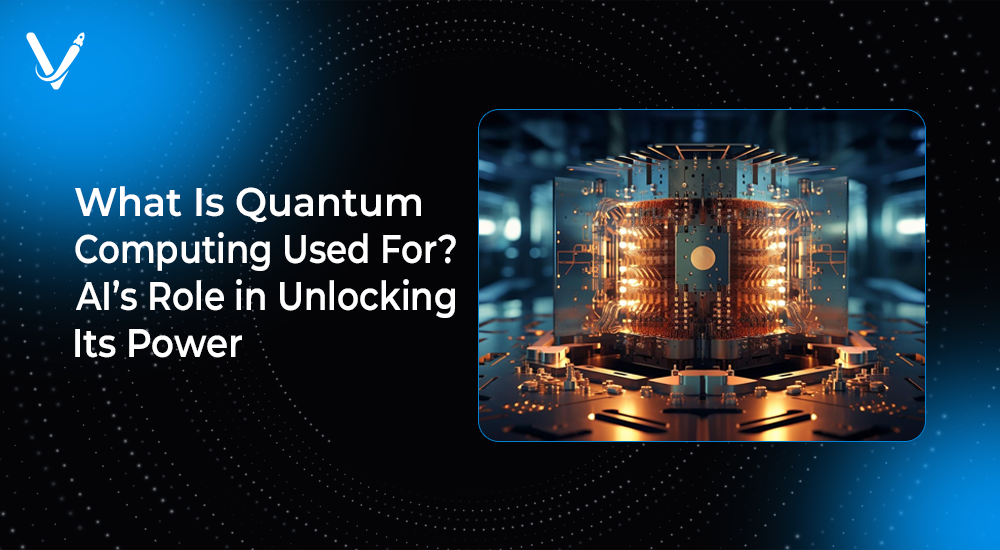What Is Quantum Computing Used For? AI’s Role in Unlocking Its Power


- Oct 7, 2025



Technology has always evolved by finding new ways to process information faster and smarter. Classical computers transformed society by performing calculations in seconds that once took humans months. But the world now faces challenges so vast—climate modeling, drug discovery, financial forecasting, and advanced AI—that even today’s supercomputers are hitting their limits. This is where quantum computing enters the story.
Quantum computing is not just another upgrade to classical computing—it’s an entirely new paradigm that redefines how information is processed. It operates on the strange and fascinating principles of quantum mechanics, using quantum bits, or qubits, that can exist in multiple states simultaneously. This ability enables quantum computers to perform calculations at speeds that would take classical computers centuries.
Yet, quantum computing’s full potential cannot be unlocked by hardware alone. That’s where artificial intelligence (AI) comes into play. AI helps optimize quantum algorithms, interpret vast quantum data outputs, and simulate complex quantum behaviors. Together, AI and quantum computing form one of the most powerful technological partnerships of the modern era—a union that promises to solve some of humanity’s toughest problems.
In this blog, we’ll explore what quantum computing is used for, how it works, the industries it’s transforming, and the critical role AI plays in unleashing its capabilities.
Before diving into applications, it’s essential to understand the foundation. Quantum computing might sound abstract, but its logic follows the laws of physics—specifically, quantum mechanics, which describes how particles behave at subatomic scales.
Traditional computers store information in bits—each bit is either a 0 or a 1. Every digital image, video, or piece of software is built using combinations of these binary values.
Quantum computers, on the other hand, use qubits, which can exist as both 0 and 1 simultaneously thanks to a property called superposition. Imagine flipping a coin: a classical bit is like the coin landing on heads or tails, but a qubit is like the coin spinning in mid-air, being both at once.
Another quantum property, entanglement, allows qubits to be linked in such a way that changing one instantly affects the others, even if they’re far apart. This interconnection enables massive parallel processing—quantum computers can evaluate multiple possibilities simultaneously rather than one by one.
Quantum systems use interference to amplify correct solutions and cancel out incorrect ones. When measured, the system collapses to the most probable answer. This unique process allows quantum computers to solve problems by exploring all potential solutions in parallel.
Together, these principles make quantum computers exponentially more powerful for specific types of problems—especially those involving massive datasets, probabilistic outcomes, and optimization challenges.
Quantum computing is not about replacing classical computers—it’s about expanding what’s possible. The technology addresses problems that classical computers either can’t solve or would take impractically long to handle.
Classical supercomputers struggle with problems involving combinatorial complexity, where the number of variables grows exponentially. Quantum systems thrive in such environments, processing massive numbers of permutations simultaneously.
This makes them ideal for real-world applications like simulating molecules, optimizing logistics routes, or analyzing cryptographic systems.
Data has become the lifeblood of modern enterprises, but processing it efficiently remains a challenge. Quantum computing accelerates machine learning models, improves data encryption, and refines predictive analytics—all of which drive smarter business decisions.
By combining AI and quantum processing, organizations gain the ability to tackle previously impossible tasks in real time, unlocking new frontiers in discovery, security, and innovation.
The practical uses of quantum computing span multiple sectors, each benefiting from its capacity to handle complexity, uncertainty, and massive datasets.
Developing new drugs involves simulating how molecules interact—a computationally intensive task that classical computers approximate rather than compute precisely. Quantum computers can simulate molecular structures at the quantum level, predicting chemical reactions with extraordinary accuracy.
Pharmaceutical companies are already experimenting with quantum models to design more effective medicines faster. For instance, simulating protein folding or molecular bonding can accelerate the discovery of treatments for cancer, Alzheimer’s, or viral infections.
When paired with AI-based pattern recognition, quantum simulations become even more powerful, identifying molecular behaviors that could take human researchers years to uncover.
Finance depends on processing massive datasets filled with uncertainty. Market fluctuations, risk modeling, and portfolio optimization involve countless variables that interact in unpredictable ways.
Quantum computers can analyze these complex systems in parallel, allowing financial institutions to make better predictions and optimize portfolios for risk and return.
AI complements this by learning from historical patterns, helping quantum algorithms refine forecasts in real time. Together, AI and quantum computing make financial decision-making faster, smarter, and more reliable.
Classical encryption methods, such as RSA, rely on the difficulty of factoring large numbers—a challenge that classical computers handle slowly. Quantum computers, however, could break such encryption using Shor’s algorithm, capable of factoring integers exponentially faster.
This duality creates both a challenge and an opportunity. While quantum computing poses risks to traditional cryptography, it also enables quantum-safe encryption and quantum key distribution (QKD)—methods that ensure unbreakable communication security.
AI assists in monitoring and detecting potential vulnerabilities in quantum communication networks, strengthening global cybersecurity resilience.
Supply chains involve countless moving parts—routes, schedules, and demand fluctuations—that create complex optimization challenges. Quantum algorithms can analyze all possible combinations of variables simultaneously to find the most efficient outcomes.
Companies can minimize fuel usage, reduce shipping times, and optimize inventory management using quantum-enhanced logistics models.
When AI is integrated, it continuously learns from real-world performance, refining these optimization strategies dynamically.
Climate prediction requires simulating planetary systems with billions of interacting variables—something traditional supercomputers struggle with. Quantum computing’s ability to model quantum interactions could provide more precise climate forecasts and energy simulations.
Researchers use AI to interpret quantum-generated data and predict environmental patterns more accurately, supporting sustainable agriculture, resource management, and disaster prevention.
Perhaps the most exciting application is AI itself. Training deep learning models requires massive amounts of data and computation. Quantum computing can drastically speed up these processes through quantum machine learning (QML).
QML algorithms leverage quantum parallelism to optimize neural networks, improve feature selection, and accelerate data clustering. This leads to AI systems that not only learn faster but also uncover patterns beyond the reach of classical models.
AI, in return, helps control and optimize quantum systems by reducing noise, correcting errors, and guiding quantum experiments—a feedback loop of continuous improvement.
AI is not just a beneficiary of quantum computing—it’s a vital enabler. Quantum computers produce complex, high-dimensional data that requires intelligent interpretation. AI acts as the bridge between human understanding and quantum complexity.
Quantum devices are highly sensitive to noise and temperature fluctuations. AI-driven systems monitor performance metrics in real time, adjusting qubit operations for stability and accuracy.
Machine learning models predict error rates and optimize quantum circuits, making quantum hardware more reliable and scalable.
Designing efficient quantum algorithms is difficult because quantum mechanics defies classical intuition. AI helps automate this process by exploring massive mathematical spaces to discover new, optimized algorithms that humans might never conceive.
Through reinforcement learning and evolutionary models, AI can experiment, adapt, and identify algorithmic shortcuts that improve performance.
Quantum decoherence—when qubits lose their quantum state—is one of the biggest barriers to practical quantum computing. AI-powered error correction systems detect patterns of instability and apply compensatory corrections before data is lost.
By continuously learning from noise behavior, AI ensures more stable computations, bringing us closer to fault-tolerant quantum computers.
Interpreting quantum outputs can be challenging due to the probabilistic nature of results. AI excels at recognizing patterns in uncertain environments, helping scientists extract meaningful insights from quantum experiments.
This symbiosis accelerates discovery in physics, chemistry, and material sciences, where quantum simulations generate enormous datasets.
AI algorithms also contribute to hardware development, designing better qubit materials, circuit architectures, and cooling systems. By simulating thousands of material configurations, AI helps identify optimal combinations faster than traditional experimentation.
This accelerates the roadmap toward scalable quantum processors with higher qubit counts and lower error rates.
When AI and quantum computing converge, they create an entirely new paradigm—Quantum AI. This emerging field merges quantum mechanics’ computational power with AI’s decision-making capabilities.
Quantum algorithms can process multiple hypotheses simultaneously, allowing AI to evaluate diverse possibilities in a single computation. This accelerates training, improves accuracy, and allows models to handle uncertain environments more effectively.
Quantum machine learning enhances data classification and clustering by evaluating all potential groupings simultaneously. This helps AI recognize patterns in noisy or incomplete data—crucial for sectors like genomics, finance, and cybersecurity.
Just as AI can generate art, text, or music, quantum generative models can create entirely new chemical compounds, materials, or data distributions. These systems use quantum superposition to explore vast creative spaces beyond classical reach.
Quantum AI systems can make probabilistic decisions with higher precision, aiding in applications like autonomous systems, stock market predictions, and logistics optimization.
The result is a form of intelligence that operates beyond classical boundaries—a blend of intuition and computation that mirrors nature’s own problem-solving mechanisms.
Quantum computing is no longer theoretical—it’s being tested and applied across industries.
IBM has made its quantum processors accessible through the cloud, allowing researchers worldwide to experiment with real quantum hardware. Its Qiskit framework integrates AI models that optimize circuit execution and reduce computational noise.
In a landmark demonstration, Google’s quantum computer performed a calculation in seconds that would take classical supercomputers thousands of years. AI-assisted calibration played a key role in optimizing this experiment.
Microsoft combines AI and quantum services through Azure Quantum, offering developers hybrid solutions for optimization, chemistry simulations, and cryptography research.
D-Wave specializes in quantum annealing—an approach optimized for problem-solving and pattern recognition. AI algorithms guide the annealing process, improving efficiency for tasks like supply chain optimization and fraud detection.
Despite rapid progress, quantum computing still faces challenges before mainstream adoption.
AI plays a critical role in addressing these issues by automating testing, improving calibration, and simulating new materials for better qubit performance.
The relationship between AI and quantum computing will shape the next generation of technology. As hardware matures and algorithms advance, this partnership will expand into every industry—from autonomous systems to personalized healthcare.
Quantum-AI hybrid systems will become integral to:
Ultimately, the convergence of AI and quantum computing will redefine what it means to “compute,” merging reasoning with quantum intuition to accelerate human progress.
Quantum computing represents a paradigm shift in how we process, analyze, and understand information. Its power lies in the strange yet beautiful principles of quantum mechanics—superposition, entanglement, and interference—turning impossibly complex problems into solvable challenges.
But this revolution isn’t complete without AI. Artificial intelligence acts as the guide, interpreter, and accelerator of quantum potential. Together, AI and quantum computing are creating a foundation for the next wave of innovation—faster, smarter, and more sustainable than ever before.
At Vasundhara Infotech, we are passionate about harnessing emerging technologies like AI, machine learning, and quantum-inspired computing to build intelligent solutions for the future. If your organization is ready to explore innovation at the quantum edge, our experts can help you design and develop systems that make complexity simple and possibility limitless.
Copyright © 2026 Vasundhara Infotech. All Rights Reserved.